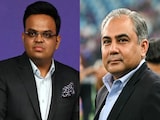Nawaz Sharif said his party will seek talks with rival Bilawal Bhutto Zardari's group on forming a coalition in Pakistan, potentially breaking the deadlock as a contentious election in the South Asian country headed for a hung parliament.
Pakistan Muslim League-Nawaz will speak with Bhutto Zardari's Pakistan Peoples Party, the veteran politician Sharif told cheering supporters in a speech where he claimed victory.
Bhutto Zardari, 35, is a scion of the Bhutto dynasty, while Sharif is a three-time former premier who returned from exile in London last year and was acquitted of corruption charges, paving the way for him to contest the election.
If the two family-based parties join forces, it could thwart jailed former premier Imran Khan, whose candidates - who were forced to run as independents - performed strongly in Thursday's election, demonstrating Khan's enduring popularity and making the polls a tight race.
"We have to sit down together," Sharif said in a speech at his family stronghold of Lahore. "It's the duty of everybody to take this country out of this quagmire."
After the election PML-N is the largest party in the parliament, Sharif said. His close aide said earlier that PML-N will win almost 90 out of the 265 seats up for grabs in the National Assembly, Pakistan's lower house. The Election Commission of Pakistan's scorecard showed the Khan-backed independents were in the lead with 90 seats followed by PML-N at 62 and the PPP at 50.
"We will talk to everybody," Sherry Rehman, a PPP senator and senior leader, told reporters in Lahore.
An alliance of the two parties may be a relief for the nation's powerful military, which analysts say was instrumental in removing Khan from power in April 2022. Khan responded by staging rallies in which he openly criticized the military. He was later sent to prison on multiple charges and his party's candidates weren't allowed to contest the election under the Pakistan Tehreek-e-Insaf, or PTI, banner. They were also barred from using the party's famous cricket bat symbol in the polls.
It would also be likely to anger Khan's millions of young supporters, who support the former cricket star's populist and anti-establishment rhetoric and see the Sharifs and Bhuttos as representing the old ways of Pakistani politics.
The strong showing by the Khan-backed independents created uncertainty about the country's future, leading to a selloff in its assets. Dollar bonds fell, with the bond maturing in 2051 sliding the most in seven months. The benchmark stock index declined 2%, the most in two months.
If Sharif becomes prime minister, he will face challenges on multiple fronts. The country's economy is in tatters, with inflation running at 28%, the highest pace in Asia, which is making life even harder for the 40% of the population who live in poverty.
Pakistan is also heavily indebted and relying on financial assistance from the International Monetary Fund. A nine-month bailout program, Pakistan's 23rd since independence in 1947, is set to expire next month, meaning one of the new prime minister's first tasks may be to negotiate a new deal.
The new leader will also have to navigate complex ties with the US and China, rising terrorism in Pakistan and tense relations with neighbors including India, Afghanistan and Iran.
While Sharif is claiming victory, the outcome of the election remains uncertain, and it may take weeks to form a government.
"Any controversy around election results will lead to political instability and in turn may make it very difficult for the next government to negotiate and implement the next IMF program," said Abid Qaiyum Suleri, executive director of the Sustainable Development Policy Institute, an independent think tank based in Islamabad.
The elections were marred by terrorist attacks in remote provinces bordering Afghanistan that killed dozens of people. On the day of the polls, Pakistan suspended mobile phone services nationwide, saying it was necessary for maintaining law and order. Then the announcement of results was delayed by more than 24 hours. In a statement Friday morning, the Interior Ministry said a "lack of communication" due to the precautionary security measures were behind the delays.
The US State Department said the elections included "undue restrictions on freedoms of expression, association, and peaceful assembly."
"Claims of interference or fraud should be fully investigated," State Department spokesman Matthew Miller said in a statement.
Sharif's party wasn't the only one to claim victory. Khan's PTI also did so in the early hours of Friday morning, while also warning supporters that election-rigging was taking place.
Khan, who was imprisoned last year and has since been sentenced in multiple other cases, which he says are politically motivated, is Pakistan's most popular politician, a former cricket star who captained Pakistan to victory in the 1992 World Cup. He has a loyal following among the country's young population.
"Investors would be watchful if protests broke out," said Adnan Khan, head of international sales at Intermarket Securities Ltd. "The next couple of days are very important."
Sharif was seen by analysts as backed by the country's powerful military as a political figure who could replace Khan. He's Pakistan's longest-serving prime minister, serving in the role for a total of nine years, but he hasn't once completed a full five-year term.
Sharif was ousted three times as prime minister, twice in the 1990s and once in 2017 after a corruption investigation following a Panama Papers leak. In 1999, the military staged a coup after he tried to remove General Pervez Musharraf as army chief.
Pakistan's military has ruled the nation for almost half of its history, and is often the power behind civilian administrations. It retains an outsized influence over the country's politics.















